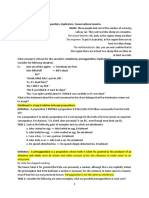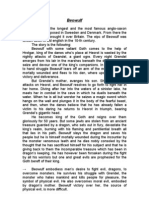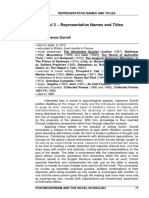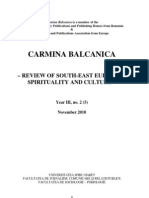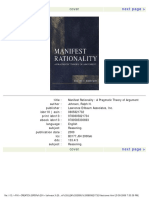Biografie Lucian Blaga
Biografie Lucian Blaga
Uploaded by
Keent LoongCopyright:
Available Formats
Biografie Lucian Blaga
Biografie Lucian Blaga
Uploaded by
Keent LoongOriginal Description:
Copyright
Available Formats
Share this document
Did you find this document useful?
Is this content inappropriate?
Copyright:
Available Formats
Biografie Lucian Blaga
Biografie Lucian Blaga
Uploaded by
Keent LoongCopyright:
Available Formats
Biography
Lucian Blaga was a commanding personality of the Romanian culture of the
interbellum period. He was a philosopher and writer highly acclaimed for his
originality, a university professor and a diplomat. He was born on 9 May 1895 in
Lancram, near Alba Iulia, Austria-Hungary, his father being an Orthodox priest. He
later described his early childhood, in the autobiographical The Chronicle and the
Song of Ages, as "under the sign of the incredible absence of the word".
His elementary education was in Hungarian at Sebe? (1902�1906), after which he
attended the "Andrei ?aguna" Highschool in Bra?ov (1906�1914), under the
supervision of a relative, Iosif Blaga (Lucian's father had died when the former
was 13), who was the author of the first Romanian treatise on the theory of drama.
At the outbreak of the First World War, he began theological studies at Sibiu,
where he graduated in 1917. He published his first philosophy article on the
Bergson theory of subjective time. From 1917 to 1920, he attended courses at the
University of Vienna, where he studied philosophy and obtained his PhD.
Upon returning to Transylvania, now a part of Romania, he contributed to the
Romanian press, being the editor of the magazines Culture in Cluj and The Banat in
Lugoj.
In 1926, he became involved in Romanian diplomacy, occupying successive posts at
Romania's legations in Warsaw, Prague, Lisbon, Bern and Vienna. His political
protector was the famous poet Octavian Goga, who was briefly a prime minister;
Blaga was a relative of his wife. He was elected a titular member of the Romanian
Academy in 1936. His acceptance speech was entitled Elogiul satului rom�nesc (In
Praise of the Romanian Village).
In 1939, he became professor of cultural philosophy at the University of Cluj,
temporarily located in Sibiu in the years following the Second Vienna Award. During
his stay in Sibiu, he edited, beginning in 1943, the annual magazine Saeculum.
He was dismissed from his university professor chair in 1948 because he refused to
express his support to the new Communist regime and he worked as librarian for the
Cluj branch of the History Institute of the Romanian Academy. He was forbidden to
publish new books, and until 1960 he was allowed to publish only translations. He
completed the translation of Faust, the masterpiece of Goethe, one of the German
writers that influenced him most.
In 1956, he was nominated to the Nobel Prize for Literature[citation needed] on the
proposal of Bazil Munteanu of France and Rosa del Conte of Italy, but it seems the
idea was Mircea Eliade's. Still, the Romanian Communist government sent two
emissaries to Sweden to protest against the nomination,[citation needed] because
Blaga was considered an idealist philosopher, and his poems were forbidden until
1962.[citation needed]
He was diagnosed with cancer and died on 6 May 1961. He was buried on his birthday,
9 May, in the countryside village cemetery of Lancram, Romania.
Blaga with daughter
He was married to Cornelia (n�e Brediceanu).[1] They had a daughter, Dorli, her
name being derived from dor, a noun that can be translated, roughly, as "longing".
The University of Sibiu bears his name today.
You might also like
- Becker Howard Photography and SociologyNo ratings yetBecker Howard Photography and Sociology24 pages
- Romanian Authors On The French TerritoryNo ratings yetRomanian Authors On The French Territory5 pages
- Lucian Blaga, Poet and Philosopher: Teodora-Georgiana Amza Phd. Student, University of PiteștiNo ratings yetLucian Blaga, Poet and Philosopher: Teodora-Georgiana Amza Phd. Student, University of Pitești4 pages
- 10 Things You Didn't Know About The Romanian Language PDFNo ratings yet10 Things You Didn't Know About The Romanian Language PDF20 pages
- Relaciones Signitficativas Relaciones Semantic As y Relaciones Lexicas100% (2)Relaciones Signitficativas Relaciones Semantic As y Relaciones Lexicas28 pages
- Mircea Nedelciu Si Tratamentul Fabulator PDFNo ratings yetMircea Nedelciu Si Tratamentul Fabulator PDF21 pages
- George Calinescu Si Proiectul Monografic EminescuNo ratings yetGeorge Calinescu Si Proiectul Monografic Eminescu5 pages
- Teoria Si Practica Traducerii - Curs de LectiiNo ratings yetTeoria Si Practica Traducerii - Curs de Lectii27 pages
- 01 Laura Zavaleanu The Topochrony of Books From The Folk The Heraldry of LoveNo ratings yet01 Laura Zavaleanu The Topochrony of Books From The Folk The Heraldry of Love6 pages
- Novel 1: - English Studies - S5P1 - Number of The Module (M27) - Professor: Mohamed Rakii100% (1)Novel 1: - English Studies - S5P1 - Number of The Module (M27) - Professor: Mohamed Rakii9 pages
- Georgeta Ciobanu-Romanian Words of English Origin100% (1)Georgeta Ciobanu-Romanian Words of English Origin138 pages
- Cultura Si Civilizatie Engleza (Sem. 1+2) - Gabriela Colipca-Ciobanu100% (1)Cultura Si Civilizatie Engleza (Sem. 1+2) - Gabriela Colipca-Ciobanu67 pages
- The Parallactic Nature of Modernist WritingNo ratings yetThe Parallactic Nature of Modernist Writing5 pages
- Ana-Maria Dragomir Romanian Folklore Poster100% (1)Ana-Maria Dragomir Romanian Folklore Poster1 page
- DORIS LESSING, The Diaries of Jane SomersNo ratings yetDORIS LESSING, The Diaries of Jane Somers3 pages
- Vintilă Mihăilescu, Căutatea AutenticitățiiNo ratings yetVintilă Mihăilescu, Căutatea Autenticității34 pages
- Hunger Knut Hamsun: Sult (1890 Hunger) Is Hamsun's Breakthrough Novel About A Young Writer StrugglingNo ratings yetHunger Knut Hamsun: Sult (1890 Hunger) Is Hamsun's Breakthrough Novel About A Young Writer Struggling10 pages
- A Diachronic Excursion Into The Anthroponymy of Eastern Romania100% (1)A Diachronic Excursion Into The Anthroponymy of Eastern Romania24 pages
- Introducere În Lingvistica Generală, Semestrul 1, 2017-2018 Curs 7No ratings yetIntroducere În Lingvistica Generală, Semestrul 1, 2017-2018 Curs 77 pages
- Virginia Woolf's The Waves:: A Study On ModernismNo ratings yetVirginia Woolf's The Waves:: A Study On Modernism23 pages
- Engleza Romana Lista Verbelor Neregulate PDFNo ratings yetEngleza Romana Lista Verbelor Neregulate PDF7 pages
- Containing Childhood: Space and Identity in Children’s LiteratureFrom EverandContaining Childhood: Space and Identity in Children’s LiteratureDanielle RussellNo ratings yet
- The Pleasure of Teaching English PoetryNo ratings yetThe Pleasure of Teaching English Poetry21 pages
- Sociolinguistics and The Sociology of Language PDF80% (5)Sociolinguistics and The Sociology of Language PDF3 pages
- Johnson, Ralph H - Manifest Rationality - A Pragmatic Theory of Argument PDFNo ratings yetJohnson, Ralph H - Manifest Rationality - A Pragmatic Theory of Argument PDF426 pages
- Guidelines For Sharing A Personal Testimony100% (1)Guidelines For Sharing A Personal Testimony2 pages
- QUIZ 4A: Expressions of Quantity - Subject/Verb Agreement: BeginningNo ratings yetQUIZ 4A: Expressions of Quantity - Subject/Verb Agreement: Beginning1 page
- Ya-Wen (Melissa) Liang & Steve Bain, Texas A&M University-Kingsville Title of Article: Exploring Acculturation Process in The United States NFMIJ V14 N1 2017No ratings yetYa-Wen (Melissa) Liang & Steve Bain, Texas A&M University-Kingsville Title of Article: Exploring Acculturation Process in The United States NFMIJ V14 N1 201710 pages
- Borce T Gjorgjievski - History of Western Magic100% (1)Borce T Gjorgjievski - History of Western Magic25 pages
- Candidate Work Sample: Tony's Story SmithNo ratings yetCandidate Work Sample: Tony's Story Smith17 pages






















